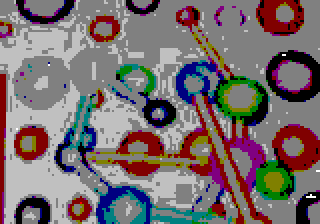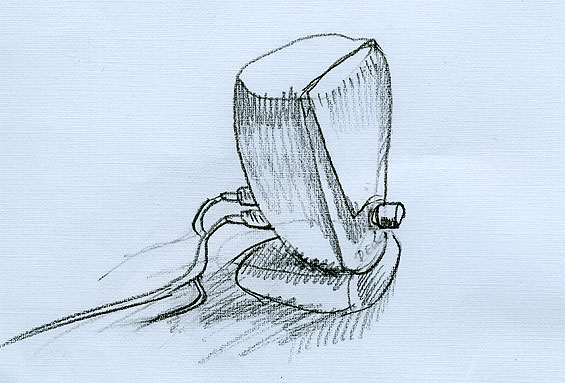View current page
...more recent posts
Variety, July 20, 2020: Linklater to Give Scanner "Makeunder" Using Original Footage
"It hasn't held up over the years," admits the sexagenarian erstwhile slacker Richard Linklater, now one of Hollywood's leading directors, speaking of his 2006 film A Scanner Darkly. "I don't know why I let them talk me into using those damn filters for everything," he says. "That digital rotoscoping technique was momentarily cool in the early '00s, but let's face it, it made Winona Ryder look cretinous in some shots. Her features were sliding all over her face. Woody, too," he adds, referring to the late Woody Harrelson, who also played "Munson" in Kingpin.
Film fans agree. "The rotoscoping technique was just wrong for that material," says blogger Joe Chip, who had a brief cameo in the film. "Take the scene where Keanu Reeves addresses the Rotary Club," Chip says. "He's wearing a suit that digitally scrambles his features, masking his identity. It's a dramatic, surreal effect, but the problem is, with that rotoscoping technique, everyone in the room looks like they're wearing a scramble suit."
That scene and others are being re-edited to remove the digital effects except where they're needed to advance the plot--such as in the "hallucination sequences" where Reeves imagines his housemates as giant insects. Other film buffs are ecstatic about the proposed changes. "Robert Downey, Jr. did some of his best work in the picture," says director Arnold Kott. "It was a riff on his creep in Altman's Short Cuts, and you hated to see his talent buried under all that faux-artistic, Photoshop-like filtering."
But others don't think the changes will make any difference. "Linklater and Dick weren't the right fit," says Bruno Bluthgeld, a scholar of Philip K. Dick, whose book the movie was based on. "Scanner was an interesting mistake the way Cronenberg's Crash was. The novels were rooted in their eras, and just as the Swinging London sexual licentiousness of the J.G.Ballard book made no sense in the post-AIDS '90s, Scanner was a tale of the late '60s/early '70s, when a generation came down off a psychotropic high and got gobsmacked by harder stuff. This was an anachronism in 2006, when the drug blight du jour was meth labs in the sticks. And not that it should matter, but the rootless addiction hell Dick went through isn't comparable to Linklater's student experiences crashing on couches in Austin, TX."
We'll know soon enough: the newly scrubbed Scanner is due out in 2021.

"The ashy, veiny hand reaches out, gas pump nozzle in hand, a stream of 'S'es pouring forth from its spout like precious drops of gasoline. Together, the hand and pump give off an eerie glow as Honest Abe looks onward, his gaze obstructed by an exaggerated dot screen. George Washington is barely visible, shrouded by an orange shadow of depression. The message is clear: Rockland County joins gas sales tax capping."
From a great, mercilessly cruel, blog post from Ironic Sans on The Art of 1010 WINS. (via mo, mbs, et al) "The radio station 1010 WINS is for New York City what CNN Headline News is for cable television. Itís just nonstop headlines, weather, and traffic, repeating every 22 minutes. Their slogan is, 'You give us 22 minutes, and weíll give you the world.' Their website, 1010WINS.com, features local headlines and news stories mixed in with syndicated newswire stories. But for me, the real treat is the unintentional art gallery at 1010WINS.com. Sometimes, 1010 WINS uses photos from the newswire. But often, some Photoshop
1010 WINS also does unbearable audio montages, something I was complaining about on this blog on September 12, 2001.
Tonight at 8:00 at the Brooklyn bookstore BookCourt I'll be talking with Ed Halter about his book From Sun Tzu to Xbox: War and Video Games (Thunder's Mouth Press/Avalon, 2006), covering a range of topics rather pertinent to what has been called either World War III or World War IV, depending on whether you're listening to former House Speaker Newt Gingrich or former CIA director James Woolsey. These include, most centrally, America's Army, a realistic game developed by the military as both a recruiting and training tool, but also combat simulators flacked at high tech trade shows, behaviorist game designers concerned with "making memories" in players, Americans blowing away virtual Bin Ladens after 9/11, games such as "Under Ash" and "Under Siege" marketed to the "Arab Street," and American activist/left hacks of violent games. The announcement for the event is a here; earlier posts about the evening are here and here. I hope to see you there.
8:00 pm
BookCourt
163 Court Street
Brooklyn NY 11201
map and directions

Highly recommended: video by Oliver Laric [Quicktime .mov] titled 787 Cliparts, via the Rhizome.org blog. It's 787 frames of generic cartoon line drawings (known as "clip art" from the days when people used scissors) blended together into a stop-motion animation. The flow is quite dazzling and lyrical. It recalls the Aeon Flux episode "Chronophasia," where Aeon becomes unstuck in time and transforms into hundreds of historical characters, rapidly changing costumes and hairstyles, as she walks across the room. And it's a vast improvement over the rather nauseating "scramble suit" in Richard Linklater's misbegotten A Scanner Darkly. (Prediction: 14 years from now Linklater will release a director's cut of that film restoring all the live action footage he shot, and do a big mea culpa for burying Robert Downey Jr. and all the great Philip K. Dick dialogue behind an obnoxious Photoshop filter. One cries for what that film could have been. Downey is a perfect Barris and the "sitting around the crash pad" scenes are as hilarious as they are in the book.)
Also recommended: Satellite Jockey's "Low Pressure (Sound) System Mix" [18 min / 20 mb .mp3], consisting of the geosat/bleepcentric pieces below. Gritty, sonically stimulating, often quite pretty:
1. Vladmir Ussachevsky - Wireless Fantasy
2. Kaffe Matthews - She could
3. Kid 606 - Site Specific Sound Installation
4. Alva Noto - 06-f117.tiff
5. Fennesz - Before I Leave
6. AGF - Loading
Better get it fast, SJ (aka Rick Silva) is notorious for removing great material from the web right after he posts it.

Ed Halter, whose book From Sun Tzu to Xbox: War and Video Games we'll be discussing at BookCourt in Brooklyn tomorrow night (y'all come!), referred me to this discussion at Henry Jenkins' blog about video game criticism and the topic of "why don't games have their Lester Bangs or Pauline Kael?" You could substitute "electronic/digital art and music" for games in that discussion and most of it would be relevant: that the critics will emerge in a generation from the ranks of kids consuming the products now, that criticism does exist but mostly on blogs and chatboards and not the established print publications, etc. Games have a different problem in their climb to mainstream acceptance, which is that, as one commenter pointed out, the experience varies so much from one consumer/player to another--and not just for the usual reasons of "the squishy subjectivity of art" but because the game has decision trees that could result in completely unlike experiences for the novice and the advanced player. In an earlier post I described the pleasures of watching my nephews playing Super Mario 64. They're experts so I got more out of being a spectator than I ever would have gotten as an inept player. The "game art" Halter describes in his book that I think I'd like best are the pieces that take apart the games and reassemble the fragments as "objects of contemplation," for example, Workspace Unlimited's Diplomatic Arena, which consists of world leaders and villains indiscriminately slaughtering each other to a montage soundtrack. Some earlier thoughts of mine on the "problem of interactivity" are here and here.
Bern, of the 8-Bit rockin' duo Bodenstandig 2000, on why he doesn't like the iPod:
We know that mp3 is part of our relative poverty, but Apple's proprietary digital rights management is an extremely stupid answer. I am the engineer-like type of guy (or at least an engineer-sympathizer) and I still canít get over these now-so-common crippling of technical possibilities. Appleís iPod? Yes, they look good and maybe they are the last bastion of classical brAun-like industrial design vs. chinese-turkish styling-trash for pimps and bitches, but still: They are crippled and I donít buy one.I agree with this. As a nascent mp3-making musician, I would rather get the product out there via "the chinese-turkish" free mp3 sites that link to me than use iTunes. At home I use Winamp to play music by others, because it doesn't stink of some kind of monopolistic capitalist scheme. Information wants to be free. (What a quaint idea!) The extent of my own capitalism is, send me 10 bucks and I'll send you a CD-R with as much music as I can put on it. For the money you get higher res recordings, the music all in one place, and no time-consuming downloading. You can rip the songs, whatever, just don't pass it off as your own work. My address is on my faq page. Check or money order to "Tom Moody."
1. You cannot just copy a song to an iPod and play it, youíll need iTunes.
2. If you buy a Bodenstandig-song at iTunes, you cannot play it on every mp3-player, you need an iPod.
